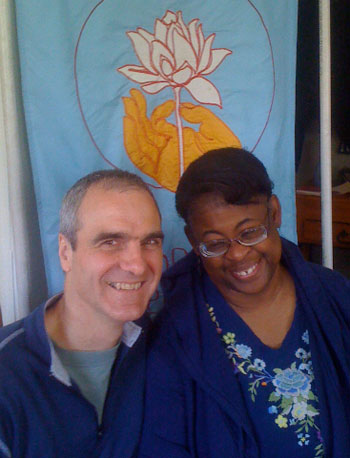
Denis Martynowych and Elaine Rose at Seattle's People of Color and Allies Sangha fundraiser "108 Minutes of Peace", May 1, 2011.

For People of Color: Support for a Retreat
Held each year in Vallecitos, New Mexico, the Annual Meditation Retreat for People of Color offers an opportunity for spiritual reflection, deepening insight, and community building to practitioners of color in a thoroughly welcoming, inclusive, and supportive environment. Attracting many social justice activists, the retreat is now entering its 15th year.
To raise money in support of the annual retreat, many sanghas across the country participated in a special event on May 1st, the “108 Minutes of Peace: A Sit to Support the Vallecitos POC Retreat”. One of those was Seattle’s People of Color and Allies Sangha (POCAAS). The event was a success – and ended in time for several participants to continue on to the local Labor & Immigration Rights May Day parade.
Many western Buddhists of color have from time to time heard the question, typically from white practitioners, why the need for a “separate” or “special” retreat? David Berrian, a member of the Seattle chapter of the Buddhist Peace Fellowship, is familiar with the question. Here is how he responded to it recently:
“The term ‘People of Color’ does have meaning, although the meaning is not precise. Mostly it means ‘not European or White’, that is, not identifying entirely with those throughout our history of racial politics who have been privileged and powerful.
“Although most white people don't experience themselves as ‘privileged’ or ‘powerful’, people of color have a long history of being marginalized, disenfranchised, and systematically denied opportunities that strongly affect their lives in the present. Racial politics continues to be a major force in our society. People of color readily understand this, while among white folks there remains much skepticism and denial.
“A major part of the Buddhist dharma is about developing an understanding of how our minds work – how easily we get trapped in rigid, self-defeating ideas about ourselves and our world which leads to suffering both for ourselves and those around us. Through meditation and dharma instruction we gradually open and radically restructure our relationship to the world. It is not an easy path. Inevitably we must confront how we have constructed our ‘self’ and the messages we've accepted about our worthiness. So to be successful most of us need the support of a sangha that we trust will lovingly embrace our transformation.
“Dharma practice for most people of color means opening to feelings of pain and of anger at the injustices experienced for generations and for injustices they see being perpetuated today. When they give voice to these feelings in a group with white people, very often the white people have a hard time accepting these words. In my experience white people often want to challenge the legitimacy of those feelings and/or want to be educated about the experiences of colored people.
“Responding to a challenge or taking on the role of educator means the person of color is no longer focusing on being open, on his or her own experience. That is why having special retreats especially for people of color is very important. To progress on the path people need the experience of a sangha that readily understands the world they experience. I'm supporting this retreat not out of charity, but because I value connection with people of color and I know that those who attend this retreat will be enriched and therefore I will be enriched as well.”
For more information about the Vallecitos People of Color Retreat, please visit: www.vallecitos.org.
Contributors: Julie Welch, David Berrian.
Photo: Rick Harlan.